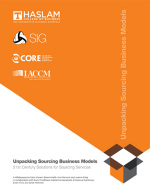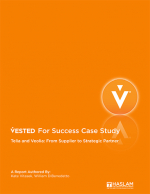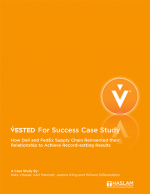Case Study: McDonald’s Secret Sauce for Supply Chain Success
Together, McDonald’s, its owner/operators, and their suppliers have created a System to be reckoned with, a System that continues to set records after 50 years, and many have credited McDonald’s with transforming the food industry, but ask anyone at McDonald’s and they will tell you they could not do it alone.
In matters dealing with suppliers, McDonald’s does indeed have a secret sauce.
But it has nothing to do with condiments and herbs.
The secret sauce of McDonald’s success is found within long-term transparent relationships based on the unwavering belief that everyone in the McDonald’s “System” can and should win.
The deep-seated culture for long-term, win-win relationships with suppliers dates back to McDonald’s inception, when founder Ray Kroc established a precedent of trust and loyalty.
Kroc believed that if the restaurant owner/operators and suppliers were successful, success would come to him as well.
Simply put, McDonald’s, its owner/operators, and their suppliers have a Vested interest in helping each other succeed.
The Vision - A System to Be Reckoned With
Kroc’s “System” philosophy is often described as a three-legged stool. One of the legs is McDonald’s employees, a second leg is the owner/operators that run the restaurants, and the third leg is McDonald’s supplier partners.
Playing By The Rules
Kroc’s ultimate desired outcome was profitable, individual stores serving consistent quality products. Finding suppliers who would be partners in the process was critical. Kroc was determined to work with suppliers that had the same long-term thinking.
Rule 1: Focus On Outcomes, Not Transactions
McDonald’s consciously makes a decision to NOT conduct business with strategic suppliers on a transactional relationship - but instead insists suppliers have long-term relationships that drive business value and achieve McDonald’s key business outcomes.
Rule 2: Focus on the What, Not the How
One of the ingredients of Kroc’s secret sauce was to know McDonald’s core competency versus his suppliers. While Kroc had the vision, he knew he needed to rely on the suppliers and restaurant owner/operators for implementation.
Rule 3: Agree On Clearly Defined & Measureable Outcomes
While food safety and quality is at the top of what McDonald’s measures with suppliers, it’s only part of the picture.
Rule 4: Pricing Model/Incentives for Cost/Service Trade-Offs
The pricing system comes back to the concept of the three-legged stool. McDonald’s, store owner/operators and suppliers each must secure a profitable, long term financial picture – one that keeps the company first and, as such, secure stable futures for all.
Rule 5: Govern For Insight, Not Oversight
McDonald’s and its suppliers do business the old-fashioned way – with a handshake instead of a formal agreement. When you have a “no contracts” philosophy with suppliers, values matter when it comes to governance, or as Kroc wrote, “The basis for our entire business is that we are ethical, truthful, and dependable. It takes time to build a reputation. We are business people with a solid, permanent, constructive ethical program that will be in style…years from now even more than it is today.”
What’s Related




Favorites





